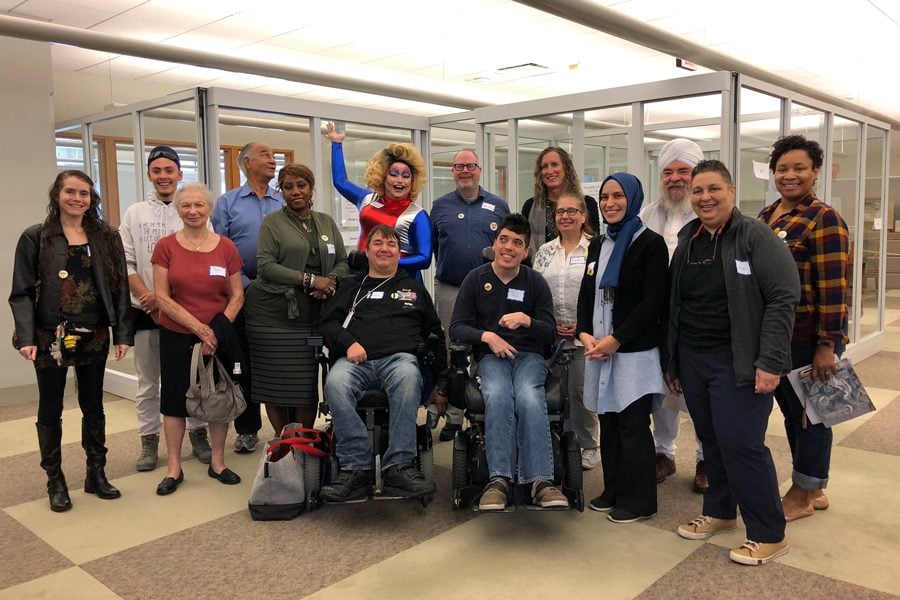Fourth Human Library at EPL aims to dismantle stereotypes
Fifteen volunteer “books” conversed with community members at Evanston Public Library’s fourth Human Library this Sunday. The event aims to foster discussion and promote understanding among community members.
October 6, 2019
Clad in a red, white and blue nylon dress, a performer with big eyebrows and even bigger hair fanned themselves with a white crepe fan while chatting with community members about their work: business consultant by day, drag queen by night.
“Sometimes I go into a client meeting,” said the performer, who goes by the stage name That British Drag Queen, “and I’ve still got glitter on my eyebrows.”
Community members conversed with people like That British Drag Queen at Evanston Public Library’s fourth Human Library this Sunday. Fifteen people — or “books” — who hold marginalized identities answered questions during one-on-one sessions for intervals of 30 minutes.
While the books, whose “titles” ranged from Gay & Disabled, Invisible Disability and Retired Police Commander, wrote three sample questions, attendees were encouraged to candidly ask questions that would typically “be inappropriate meeting somebody on the street,” said EPL volunteer coordinator Mary Kling.
“It gets people to talk to one another, break down barriers and unlearn prejudice,” said Kling, who organized the event with librarian Julie Rand. “It’s designed to be a comfortable place for that kind of conversation.”
The event is “under the umbrella” of the Denmark-based Human Library. Since 2000, the not-for-profit organization has promoted its mission to “unjudge someone” by sponsoring human libraries in over 80 countries.
That British Drag Queen, who performs monthly at The Glenwood in Roger’s Park, said they were drawn to drag as a “creative outlet” after attempting suicide in March 2018. The former BBC journalist said they hope their story challenges stereotypes surrounding drag.
“I want them to understand that there is no single experience of drag. Drag is all sorts of different things,” they said. “It’s the decision you make to present yourself to the world. It’s a social script that people are not familiar with. It’s playing with gender, and in America today, that’s a protest.”
Many of the books’ stories are non-linear. Amal Kambal, a lesbian woman who sought political asylum in the United States in 2001, volunteered as a book for the second time. Kambal was living in Egypt when police arrested 52 men at a floating disco; many people on the boat were gay men. Although Egypt doesn’t criminalize homosexuality, authorities have historically persecuted people on the basis of their sexuality.
She sought asylum in San Francisco soon after the arrests, which she said compounded the fear and pain of living with a “big mask” over her identity. She said she hopes her story redefines current discourse surrounding immigration.
“People are not coming here because it’s only a choice,” Kambal said. “They’re seeking a new home for a reason. If I was accepted in Egypt, I wouldn’t have left my home. You leave and run because you’re forced to.”
Other books included Patti Flynn, who is transgender, and African American activist Bennett Jones Johnson.
Kling said the event has grown in size since the library first hosted it in April 2018. Of this years’ books, she said around half have participated in the Human Library before.
Evanston resident Nicole Koppel attended the event for the third time. Inspired by the Human Library’s potential to promote understanding, she raised money to bring the event to her daughter’s school, Baker Demonstration School. Koppel commended the event’s inclusive principles.
“It challenges stereotypes. It gives people an outlet,” she said. “I think conversation sets people free of their own blinders.”
Email: [email protected]
Twitter: @herscowitz
Related stories:
–Evanston Public Library explores identity-based discrimination through human ‘books’
–Community members engage in conversation about prejudice at EPL event


